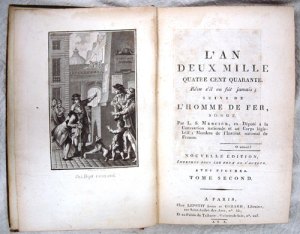 In the last ‘Snippet’ we looked at a German opinion of the French. Now we are going to go back in time further, for a French opinion of the Germans, the English, and themselves.
In the last ‘Snippet’ we looked at a German opinion of the French. Now we are going to go back in time further, for a French opinion of the Germans, the English, and themselves.
I will probably be straying rarely into the world of fiction, but occasionally it can offer an historical perspective, when the views of the author shine through the writing. I have been reading a book that could be loosely termed ‘science-fiction’, but was in fact written in 1770. No, sci-fi was not born with H.G. Wells!
Talking of H.G. Wells, the plot of one of his books, The Sleeper Awakes (for me, the greatest of his books) is remarkably similar to the plot of today’s ‘snippet’: Memoirs of the Year 2500, by Louis-Sébastien Mercier, translated from the French L’An 2440, rêve s’il en fut jamais, in which a man falls asleep, to awake in Paris, in the year 2440 (or 2500 in the translated version). The book is structured almost like a guide book, with very detailed descriptions of everything he sees (beyond that there is little actual plot!) When he finds a painting depicting characters of different nations, the book tells us more about French opinions of the past than anything to do with the future:
The Englishman, in an attitude rather haughty than majestic, standing upon the point of a rock, commanded the ocean, and gave to a vessel the signal to visit the new world, and bring him back its treasures. His bold looks declared that his private liberty was equal to that of the public. Contending fleets, growling under the strokes of the tempest, afforded his ear sweet harmony. His hand was constantly ready to seize the sword of civil war, and with a smile he looked stedfast at the scaffold, on which fell a head and a crown.
The German, under a sky that flashed with lightning, was deaf to the roaring of the elements: it was hard to say whether he braved them, or was insensible. His eagles tore each other by his side, which to him it was more diversion. Wrapped up in himself he beheld his destiny with a philosophic or insensible eye.
The Frenchman, full of noble and elevated graces, presented a refined aspect. His figure was not original, but his manner was great. Imagination and judgment were expressed in his countenance; he smiled with an address that seemed to approaach deceit. There ran through the whole of his figure much uniformity. His colours were pleasing, but there was nothing of that boldness, nor of that fine effect of lights, which were admired in the other pictures. The sight was fatigued by a multiplicity of details, that reciprocally injured each other. An innumerable crowd bore little drums, which they were continually beating, and thought they imitated the roaring of canon; it was a passion as busy and boisterous as it was weak and transient.
If you would like to receive an email each time a new entry is posted on this blog, please click the “Follow Windows into History” button on the right of the screen.


Pingback: Blog News | Windows into History (Reblogs and News)